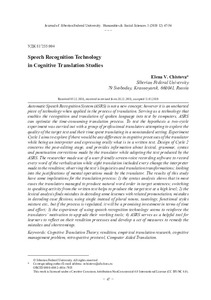Speech Recognition Technology in Cognitive Translation Studies
Скачать файл:
URI (для ссылок/цитирований):
https://elib.sfu-kras.ru/handle/2311/71043Автор:
Chistova, Elena V.
Чистова, Е.В.
Дата:
2018Журнал:
Журнал Сибирского федерального университета. Гуманитарные науки. Journal of Siberian Federal University. Humanities & Social Sciences;2018Аннотация:
Automatic Speech Recognition System (ASRS) is not a new concept; however it is an uncharted piece of technology when applied in the process of translation. Serving as a technology that enables the recognition and translation of spoken language into text by computers, ASRS can optimize the time-consuming translation process. To test the hypothesis a two-cycle experiment was carried out with a group of professional translators attempting to explore the quality of the target text and their time spent translating in a nonstandard setting. Experiment Cycle 1 aims to explore if there would be any difference in cognitive processes of the translator while being an interpreter and expressing orally what is in a written text. Design of Cycle 2 concerns the post-editing stage, and provides information about lexical, grammar, syntax and punctuation corrections made by the translator while adopting the text produced by the ASRS. The researcher made use of a user-friendly screen-voice recording software to record every word of the verbalization while sight translation included every change the interpreter made to the rendition; observing the text’s linguistics and translation transformations; looking into the justifications of mental operations made by the translator. The results of this study have some implications for the translation process: 1) the syntax analysis shows that in most cases the translators managed to produce natural word order in target sentences; switching to speaking activity from the written text helps to produce the target text at a high level; 2) the lexical analysis finds mistakes in decoding some lexemes with related pronunciation, mistakes in decoding case flexions, using single instead of plural nouns, tautology, functional styles mixture etc., but if the process is regulated, it will be a promising investment in terms of time and effort;3) the experience of using speech recognition technology seems to reinforce the translators’ motivation to upgrade their working tools; 4) ASRS serves as a helpful tool for learners to reflect on their rendition processes and develop a set of measures to remedy the mistakes and shortcomings Система автоматического распознавания речи (ASRS) уже не является новой технологией,
однако считается перспективной в контексте переводческой деятельности. Являясь инструментом, позволяющим распознавать и декодировать разговорную речь в письменный формат, ASRS способствует оптимизации длительного процесса перевода. Для проверки гипотезы был проведен двухэтапный эксперимент с группой профессиональных переводчиков, во время которого проверялось качество переводного текста и потраченное на перевод в нестандартной обстановке время. Экспериментальный цикл 1 направлен на выявление особенностей когнитивных процессов переводчика, который пытается перевести и синхронно вербализовать письменный текст. Дизайн цикла 2 относится к этапу постредактирования и представляет анализ лексических, грамматических, синтаксических и пунктуационных корректировок переводчика при адаптации текста, подготовленного ASRS. Результаты этого исследования можно изложить следующим образом: 1) синтаксический анализ показывает, что в большинстве случаев переводчикам удалось создать естественный порядок слов в переводных предложениях, а переключение на устную репрезентацию письменного текста помогает избежать интерференции в переводе; 2) лексический анализ обнаруживает ошибки при декодировании некоторых лексем со схожим произношением, неправильные флексии, замену множественного числа единственным, тавтологию, смешение функциональных стилей и т.д., но если процесс усовершенствовать, то ASRS станет многообещающим ресурсом с точки зрения времени и усилий; 3) опыт использования технологии распознавания речи усиливает мотивацию переводчиков к модернизации рабочего инструментария; 4) ASRS служит полезным инструментом для саморефлексии учащихся и принятия ряда мер по устранению переводческих ошибок и неточностей
Коллекции:
Метаданные:
Показать полную информациюСвязанные материалы
Показаны похожие ресурсы по названию, автору или тематике.
-
Interactivity of Simultaneous Interpreters as Actors of a Cognitive Event
Chistova, Elena V.; Чистова, Е.В. (Сибирский федеральный университет. Siberian Federal University, 2020-03)The paper refers to studying interactivity models of simultaneous interpreters in the field. It describes the process of simultaneous interpretation as a cognitive event considering two participants in the context of ... -
Interactivity of Simultaneous Interpreters as Actors of a Cognitive Event
Елена, Викторовна Чистова (2020-03)В статье рассматривается процесс синхронного перевода в контексте теории распределенного познания. Распределенный характер деятельности синхронных переводчиков подразумевает взаимообусловленность индивидов, языка, коммуникации, ... -
COGNITIVE BASIS OF MAKING CREATIVE DECISIONS IN TRANSLATION ACTIVITIES
Чистова, Елена Викторовна; Колмогорова, Анастасия Владимировна (2020-08)The purpose of the paper is to systematize, refine and supplement the available theoretical knowledge about translation creativity according to the trends of the 21st century. The author describes the available results of ... -
Consciousness Reflecting Reality as an Epistemological Basis of the Professional Skills of a Psychologist and a Translator: Theoretical Parallels
Sokolovsky, Yaroslav V.; Соколовский, Я.В. (Сибирский федеральный университет. Siberian Federal University, 2015-12)Alexei N. Leontiev, a famous Russian developmental psychologist and the founder of activity theory, attached great importance to the concept of reflection in psychology. In this article, we intend to show the theoretical ... -
Cognitive Political Discourse Analysis: Creative Translation Teaching Case
Ubozhenko, Irina V.; Убоженко, И.В. (Сибирский федеральный университет. Siberian Federal University, 2020-03)The paper elaborates on teaching creative translation and analyses the case of cognitive political discourse and its translation decision-making process. The research is based on the example of modern political terminology ...

